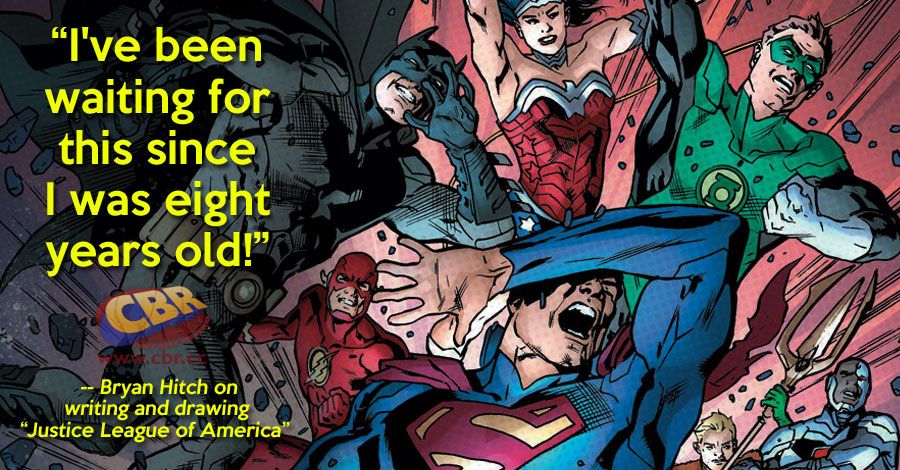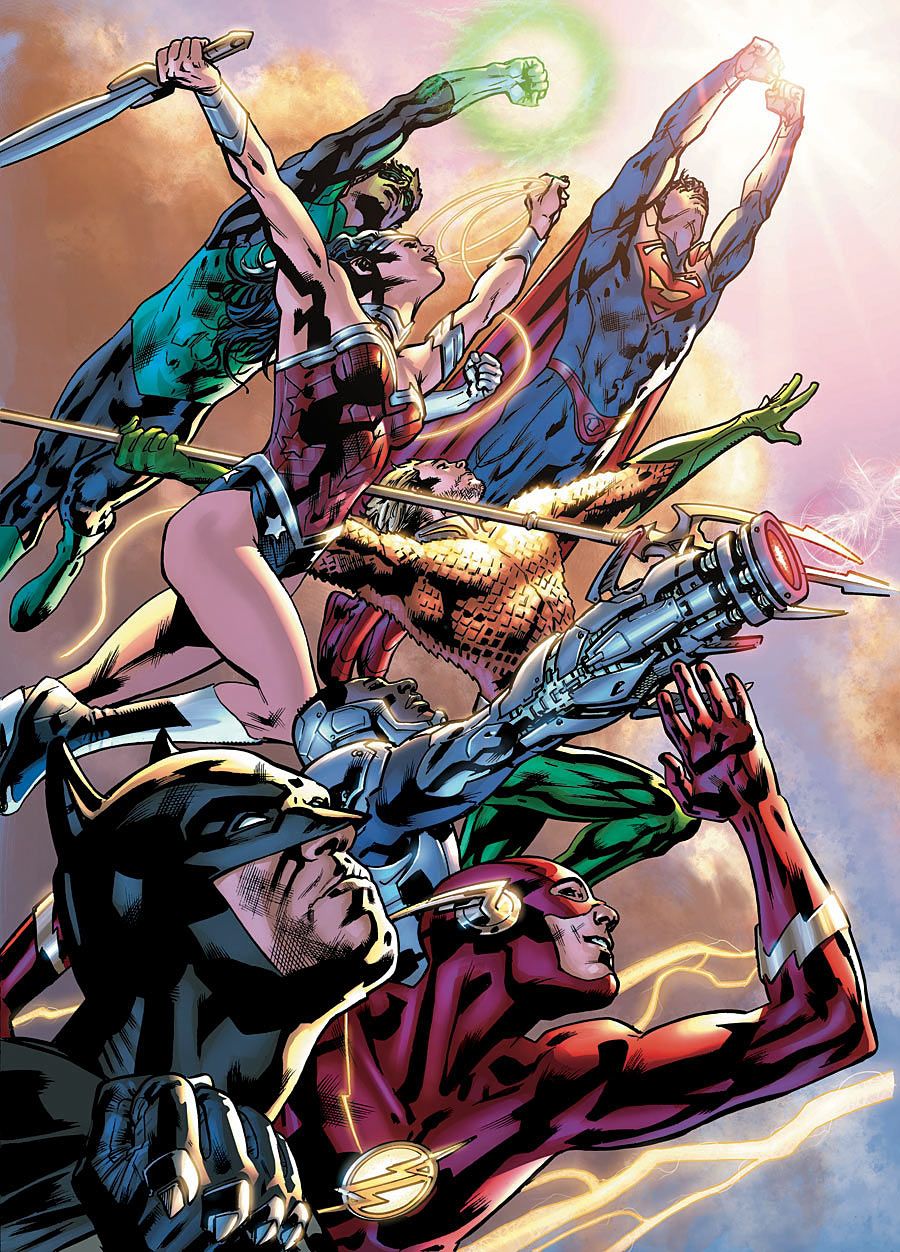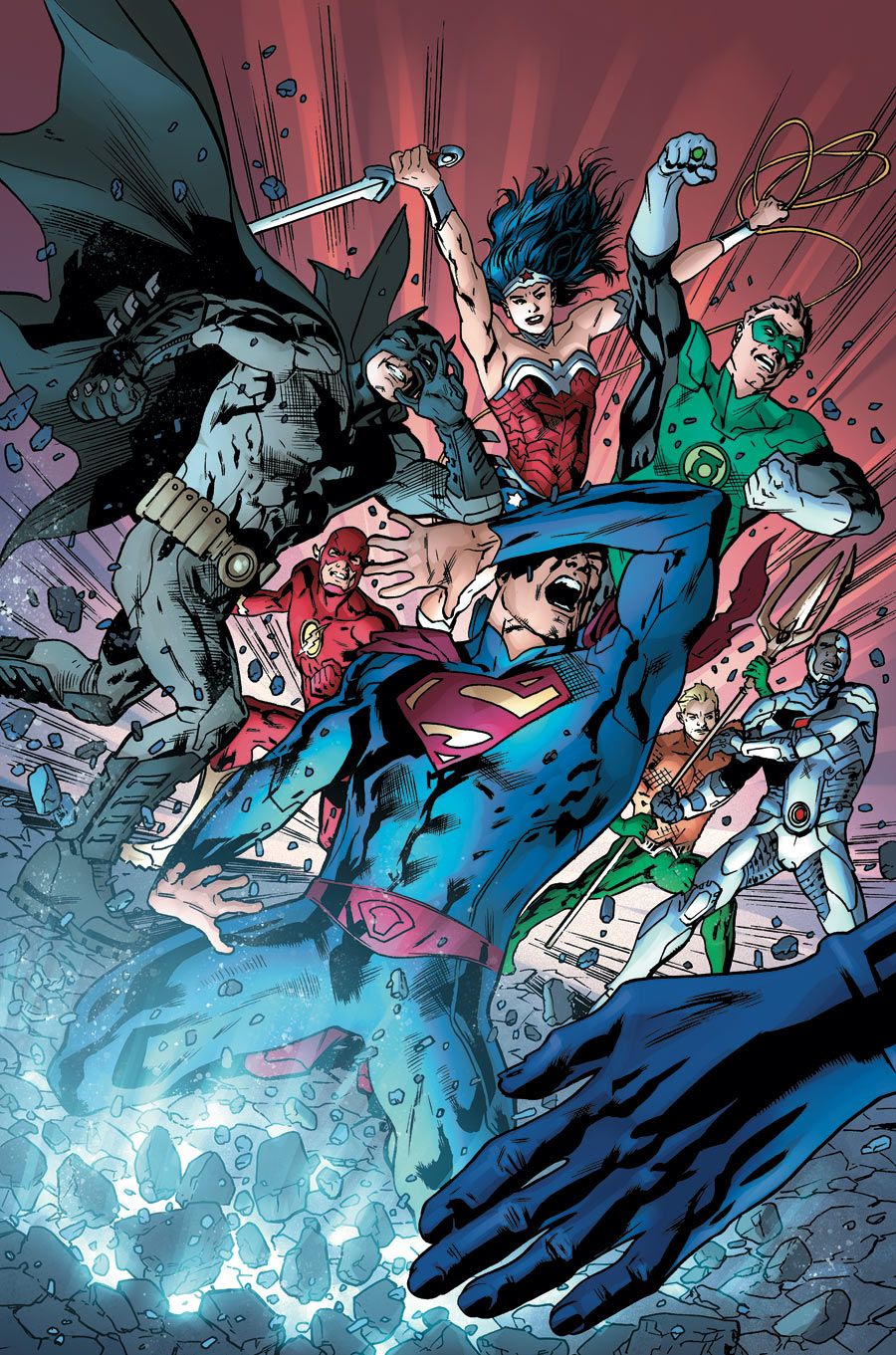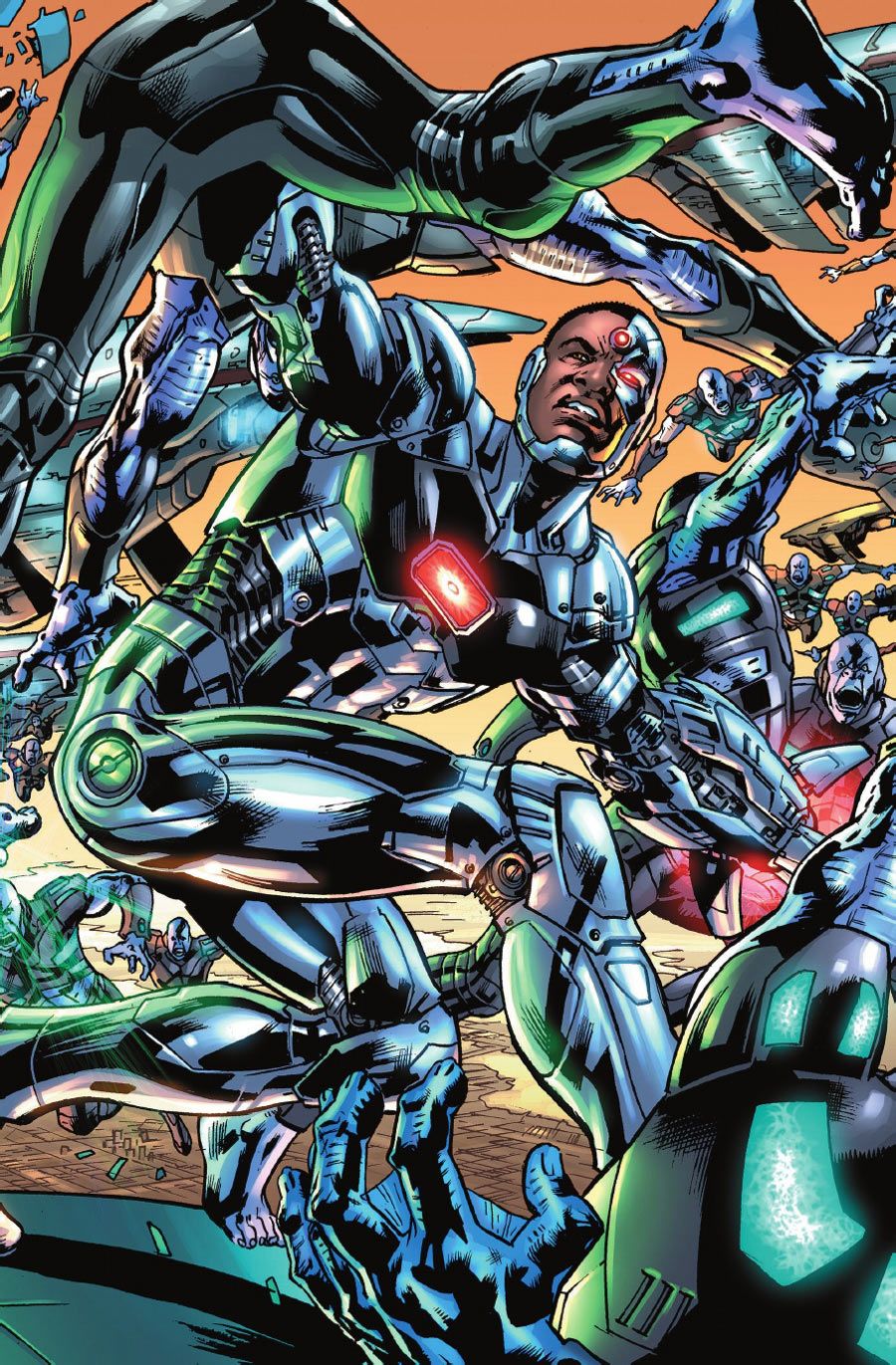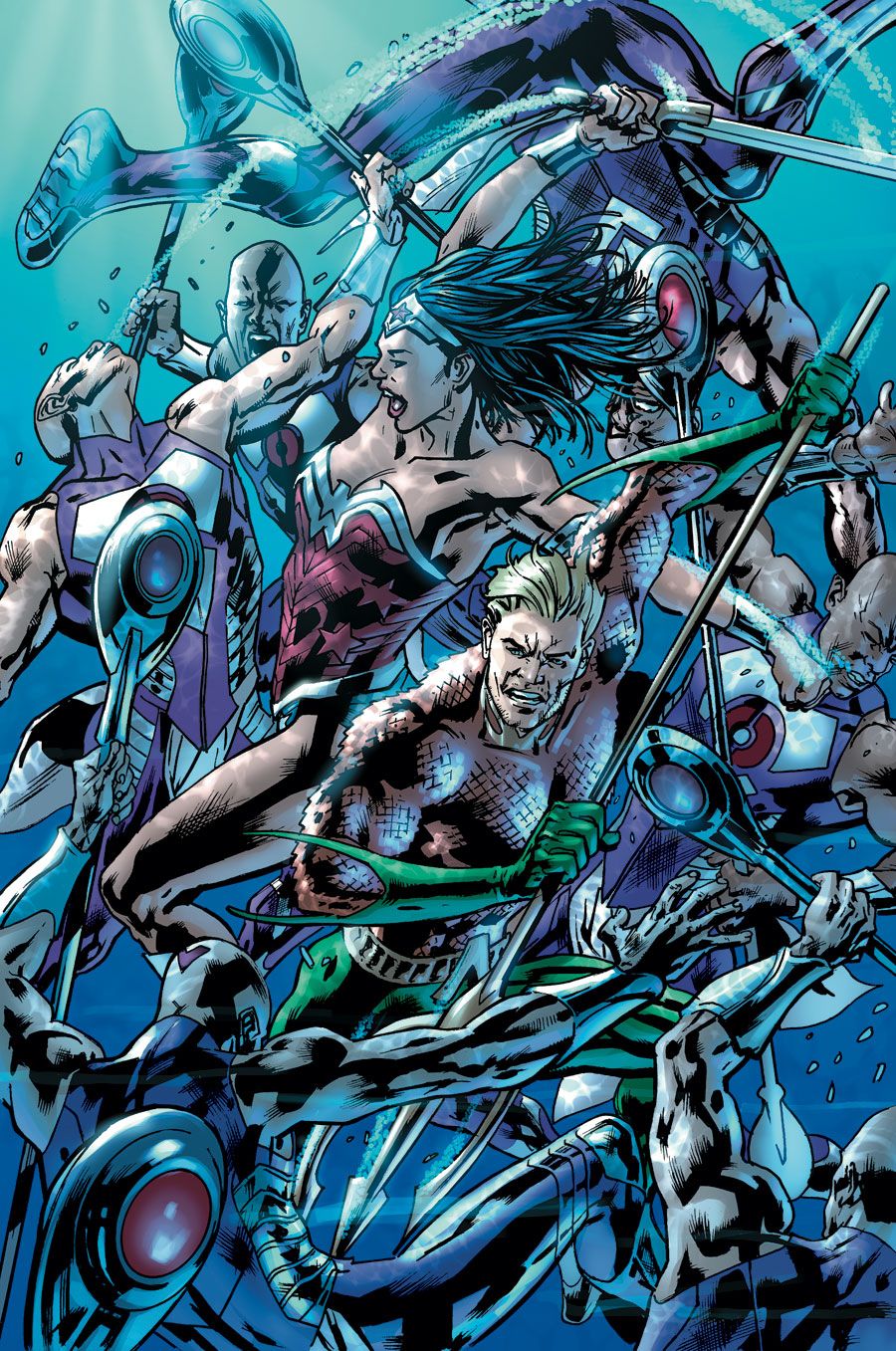Bryan Hitch has been preparing for his new "Justice League of America" series since he was eight years old.
The superstar comic creator tells CBR News that the greatest influences from his childhood are the "Super Friends" animated television series, and industry legend Curt Swan's artwork on "Action Comics" and "Superman."
RELATED: Bryan Hitch Debuts 7 "JLA" Covers, Calls Series the "Reason I Got Into Comics"
Recognized as a world-class illustrator, Hitch is also writing the new ongoing title, which will feature the same seven superheroes as Geoff Johns and Jason Fabok's "Justice League" -- Superman, Batman, Wonder Woman, Green Lantern, The Flash, Aquaman and Cyborg. However, Hitch's roster, despite current statuses elsewhere in the DC You, will feature Bruce Wayne as Batman while a bespectacled Clark Kent will remain Superman's secret identity (or vice versa).
In a candid conversation, Hitch also explained the similarities (few) and differences (many) between "The Ultimates" and "Justice League of America," and teased which other DC Universe team title he would love to relaunch.
CBR News: Much has been made about your "widescreen" art style, but I want to talk to you about storytelling as you're also serving as the series writer. When telling stories with DC Comics' most iconic heroes, where do you start to ensure you are bringing something truly new to the franchise?
Bryan Hitch: Well, I can't start with that sort of assumption really. When Dan [DiDio] asked me to do something, a genuine spark was lit, and this idea, or at least the trunk of it, came together in a moment. I wasn't aiming at the idea of newness or freshness. If I'm bringing anything specific to this, it's likely more classic than anything else. So the story came first. It wasn't an invitation to do "JLA" or "Superman" or anything that specific, it was just to do "something" -- and this is what happened, so it was all a very natural, organic process. What I didn't want to do was limit myself to what I'd drawn before or by my shortcomings as an artist. I just wanted to write the best version of this story that I could, and if I'm pushing myself anywhere, it's there.
Did you go back and read old Gardner Fox "Justice League of America" stories in order to immerse yourself in the DNA of the world's greatest heroes, or at least your issues of "JLA" that were written by Mark Waid?
I didn't read anything at all. This stuff is my DNA. DC is why I draw comics. It's what made me want this damn silly job in the first place. I've been waiting for this since I was eight years old, for God's sake! I've had huge success and a great time at Marvel, and I'm still going to be doing creator-owned stuff, but really, if I had a dream job, I'm doing it now. I have 37 years of waiting, so I'm not short of ideas for these guys.
The opening of the first issue is pretty powerful, and we quickly learn in the course of the story that Superman is going to die. At one point, we even see a room of dead Supermen from a number of alternate realities. Hundreds, if not thousands, of writers and artists have tackled the Man of Steel over the past 75 years. What do you think makes him tick and resonate with readers?
I don't know. I can only tell you how he works for me. My comic reading coincided with "Superman: The Movie," so I had that on the one hand, and Curt Swan's Superman on the other. I know folks talk about his easygoing nature, but actually, Clark was the mild-mannered one, not Superman. I remember Superman losing his temper a lot, and Christopher Reeve's Superman certainly lost his cool with Luthor and Zod.
There's a well-controlled temper there -- power kept in check -- but he is immensely powerful. What you get is a more human-than-human [character]. He's the last Kryptonian, for sure, but he's had a rural upbringing by very decent folk and, given his power, he's had to work very hard to be normal -- to be human. It's possibly a studied performance to hold his power in good control, to be human, but I think it makes him that much more human. More caring, more decent and more angry -- when he is. That super-humanity extends beyond his external power and strength to a deeply emotional core. He's super-human, extra-human. He's the best human he can be.
And what about the yin to his yang, the Dark Knight?
Well, Superman's parents died too, but their saving of Kal was, by definition, an act of hope and courage, which is the polar opposite of Bruce's experiences in watching his parents die. Superman symbolizes trust and hope, whereas Batman plays on fear. Batman is always the smartest guy in the room. He's trained with the best at everything he could need to carry out his mission, which I suppose makes him, by default, second best at everything. All of that in one man, though, makes him the best prepared for anything. He's Sherlock Holmes, Zorro and Dirty Harry all in one. I think he and Superman also compliment each other well. Their differences are their combined strengths.
It's funny; I was asked by one of my kids, who is the League's leader? And I couldn't initially answer. Then I realized that they are all leaders. All experts. All alphas. Their strength is that they aren't a team of commanders and soldiers, but that they are all the best, the greatest, and in working well together, they each defer when they need to and lead when most appropriate. I think that's an interesting group dynamic.
Like Geoff Johns and Jim Lee's "Justice League" #1, your first issue features Cyborg as a founding member of the team. Did you consider using Martian Manhunter or any other DC Comics' characters?
I didn't, really. I'd read the first few "JL" trades from Geoff, Jim and the others, so when Dan suggested my story would be great way to relaunch a classic JLA, I didn't consider any lineup other than that one. I suppose once that story and those people were set in my head, it was the only way I saw it playing out. I could see all them, including Cyborg, having a major role. Besides, "The New Teen Titans" was a favorite DC comic growing -- and yeah, I'd love to relaunch that one too -- so having him in the JLA is a real bonus.
How will this series interconnect with "Justice League," "Justice League United" and the rest of the DCU titles?
Short term, I don't know. It's going to have its own identity for now. That's not to say that we won't get together one day and plan some insane crossover event, but there's nothing planned right now. I'm building towards an endgame for my work on "JLA," so I'd like to stay focused on that. I've seen that, due to the post-"Convergence" shifts in core books, there are some questions about where it fits in continuity. My basic response is that it fits anywhere you need it to in order to relax and enjoy it. Mmore than that, what Scott [Snyder] and Greg [Capullo] are doing in "Batman" is their story in that book. What's happening in "Superman" is a story for that book. To add those events to the events in "JLA" would probably overcomplicate it for easy reading.
Long term, seven volumes of "JLA" in a book store, and I want them to feel like a complete story that makes overall internal sense, not one that tells you to buy other books to understand what's going on. So if you want to feel like it takes place before those other books, after them, beside them or under them, that's cool. My own feeling is that they'll eventually circle back to a familiar status quo. Bruce is Batman, Hal is GL and Superman wears glasses when he's walking around with a secret identity. They are core to those characters, and I'm sure we'll see that return when they're ready to get there again.
I haven't not acknowledged them because I'd prefer not to though, I did ask. Some of it is the practicality of having written this "JLA" arc before I even started drawing it and those post-"Convergence" shifts weren't on the cards. I did ask whether I needed to make adjustments, and DC very firmly said to stay my course.
Obviously after only one, albeit oversized, issue, you're not going to give everything away, but what can you tell us about the Church of Rao, Infinity Corporation, and how the two are related? And can you confirm that Infinity Corporation is a reimagining of Infinity, Inc.?
I can neither confirm nor deny anything. [Laughs] Read the story. I guarantee you'll get the answers. Maybe not the ones you're expecting, but...
Can Vincent and Alexis from Infinity Corporation be trusted? And what can you tell us about the Stones of Forever?
Two good questions, and I do devote much story to these questions -- but I'm not telling you. At least, not here.
There is an exchange between Vincent and Superman when Vincent says, "All you need to do is put your own life ahead of everyone else's for once, and if you can't do that, we're all as good as dead." Why is this "Spock logic" the hardest choice possible for a superhero, especially Superman?
Because he'll never accept that rationale. He's being given an impossible choice, but the hero he always is means he will have to find another way, a third choice. He can't accept others must be sacrificed so he lives. He'd never do that, but he absolutely will never accept that he can't save those that need saving.
Are there any major differences or similarities between Marvel's Ultimates as you co-created them with Mark Millar and the Justice League?
They're very different books, and they have very different approaches in story and art. You're dealing with myths and legends here rather than super-soldiers and such. The power levels are off the charts, and the League lends itself to very different stories.
I love both, though. Letting "The Ultimates" go was very hard, as burned out as I was at the time. Mark and I talked many times about going back, but it's such a different experience to working on "JLA." My plans are hugely ambitious, and I might be over-reaching -- I hope not -- and really, I suppose that's the biggest difference; as much as it was a wonderful collaboration with Mark, as "The Authority" was with Warren [Ellis], it was, in the end, a book I drew and didn't write. Here, it's very personal and, good or ill, my course to chart. Fortunately I've had 37 years to get my sleeves rolled up and I'm ready to go.
I loved "Super Friends," both the cartoon and the comic. Some of my kids -- I have many -- watched them on YouTube, and read the comics, too. For me, the best Justice League of America is a blend of the League and the Super Friends -- or at least that's what my inner eight-year old says. [Laughs] I'm not trying to recreate the comics I read as a kid, but I am trying to capture how I felt when I read them. This has been years coming, and I'm having a great time.
"Justice League of America" #1 by Bryan Hitch is available now.

